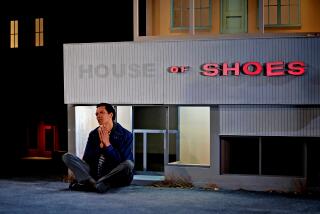Production Harks Back to the Old-Fashioned Musical
- Share via
Bad books always have plagued musicals. One weak act can wreak havoc. Stephen Sondheim’s “Into the Woods” and “Sundays in the Park With George” were criticized for weak second acts, and Lerner and Loewe’s “Paint Your Wagon” is rarely produced because of its weak overall book.
The safest road is a property that already has proven itself as a play, successful and well-constructed throughout. Shaw’s “Pygmalion” became “My Fair Lady,” Thornton Wilder’s “The Matchmaker” became “Hello, Dolly!” And Noel Coward’s “Blithe Spirit” became “High Spirits.” It’s a long list.
Anthony Calabrese was kidding around with his writing partner and ex-wife, Rosalie Calabrese, one night, speculating who could have written an appropriate score for different plays. One hypothetical was Oscar Wilde’s “The Importance of Being Earnest.” The musical team had to be Wilde’s contemporaries, Gilbert and Sullivan.
Anthony Calabrese recalls, “We thought it was an intriguing idea.” And they set to work on “Not in Earnest!,” now in its West Coast premiere at the Lionstar Theatre after successful runs at the Dorset Playhouse in Vermont and the Quaigh Theatre in Manhattan.
The score--the Calabrese team wrote the music and lyrics--is flavored with Gilbert and Sullivan. But their book remains true to Wilde.
“The nice thing about doing this property,” Anthony Calabrese says, “is that we knew where we were going. We did very little tampering with the play. There are some words that are not Wilde’s, but I defy anyone to find them. And there are places where we use Wilde lines from another play. We tried to be very, very faithful.”
Calabrese’s early life predisposed him to the stage musical. His Italian grandmother spoon-fed him opera as a child, and his mother was a “gypsy” in Broadway musicals. He studied with musical theater icon Lehmann Engel, and has won two Awards for Musical Theatre from the American Society of Composers, Authors and Publishers.
Like many people in the business, Anthony Calabrese is concerned about the state of Broadway musicals. Shows such as Andrew Lloyd Webber’s, he says, are spectacle, period. Nor are they helped by Webber’s habit of lifting melodies, he said. Calabrese recalls his 19-year-old daughter listening to a recording of “Brigadoon.” When she heard “Come to Me, Bend to Me,” she complained that it had been stolen from Webber’s “Phantom of the Opera.” Calabrese patiently showed her proof that “Brigadoon” was written in 1947.
Recalling the golden age of Broadway musicals, which faded as the ‘60s began, Calabrese says, “When critic Clive Barnes started writing for the New York Times, he said that musical theater should be based on popular taste. He completely changed all the rules. It was always the other way around. Broadway was the forerunner of popular music. It dictated the taste.”
But the early ‘60s spawned the Beatles and a new era in pop music.
“Rock has had an effect on Broadway,” he says. His singing of a Jerome Kern standard, Calabrese explains, prompted his daughter to ask, “Why are you singing that nerdy music?”
Calabrese bridles at the thought. “Jerome Kern is not nerdy. He was brilliant. And it’s sad, because the background of young people today is rock. So a Webber is going to appeal to that crowd. To me, if you don’t know the past, you really can’t see the future.”
“Not in Earnest!,” he says, is exactly what he and his partner wanted to write: the type of musical that used to be the standard.
“I think people just like to come to the theater and laugh,” he says with a chuckle, “and have a good time. They don’t want to see singing chandeliers. We thought it would be entertaining and fun to do something that’s just old-fashioned. We feel that we were right.”
More to Read
The biggest entertainment stories
Get our big stories about Hollywood, film, television, music, arts, culture and more right in your inbox as soon as they publish.
You may occasionally receive promotional content from the Los Angeles Times.










